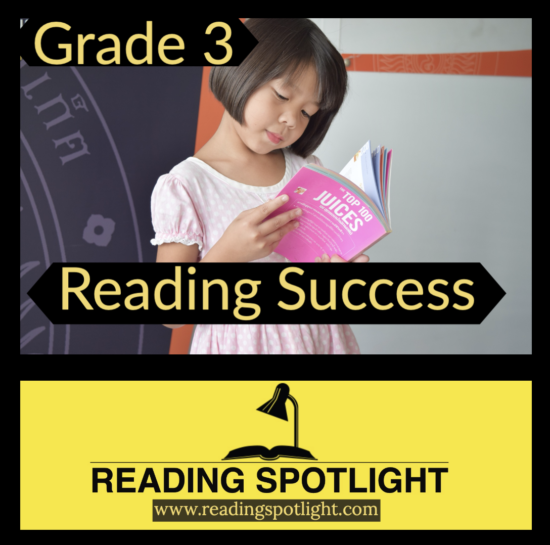One year builds on the next, then the next.
For grade three reading success, all of our tips from the previous years apply–Kindergarten, Grade 1, Grade 2.
This year is the final chance to learn decoding skills and fluency before the content load and text become more difficult.
Grade Three reading success provides a good, basic foundation for all future reading.
- Your child should be reading 15-30 minutes daily to practice and develop fluency. (S)he should read aloud to an adult sometimes so that word accuracy, fluency and comprehension can be monitored.
- Make a quiet place away from all distractions for him or her to study, do homework, and read. Turn off the TV, the computer, and the cell phone!
- Your child should have mastered decoding new words with short, long, and irregular vowels. (Check out our Level 3 Reading Tutor Packet covering mostly irregular vowel clusters. We also have Bingo Games and Word Searches available for these skills in the Reading Spotlight Store.
- (S)he should know all major irregular, high-frequency sight words.
(Check out our 100 most important words: Sight Word Kit A & Sight Word Kit B.) - This year the focus will be on reading comprehension first and then decoding skills such as prefixes, suffixes, and syllabication. Homonyms and words with multiple meanings are also important this year. (See our Homophone Crossword Puzzles for important and enjoyable extra practice in spelling and grammar.)
- If your child is still having difficulty with decoding skills, try to find out if any third grade teacher in your school is also a reading specialist. Many colleges train reading specialists, but with program cuts, they are no longer acting as specialists; you will often find them as classroom teachers. Try to get your child into a reading specialist’s classroom. If unavailable, try to find a learning center to help your child attain grade level reading before fourth grade. Waiting and hoping usually does not work. A center which guarantees improvement is preferable, especially if it is costly. Tutoring by classroom teachers is sometimes effective, sometimes not, with struggling readers. At bare minimum, use a local community center for after-school tutoring, but it is advisable to come prepared with a list of decoding skills your child needs to work on. Our free Reading Profile might be of some help with this.
- A third grade reader should be self-correcting miscalled words. This is an indication that comprehension is his or her main focus.
Comprehension strategies which are important now are:
- Background concepts
- Literal recall
- Inferences
- Vocabulary/ Synonyms/ Antonyms/ Homonyms
- Grammar
- Categorizing
- Organization
(main idea, sequence, important/ unimportant details) - Cause/effect
- Drawing conclusions/Predicting outcomes
- Appreciation
(explanations which explain WHY something was enjoyed or not) - Have your child evaluate his or her own reading habits. Our Reading Habits Self-Help Test is free in the Reading Spotlight Store.
You can’t underestimate the importance of your child’s decoding skills being at grade level BEFORE (s)he reaches grade 4 when the content load is much more difficult, and the focus of reading instruction is no longer on decoding of words.
© Reading Spoltight 2020


